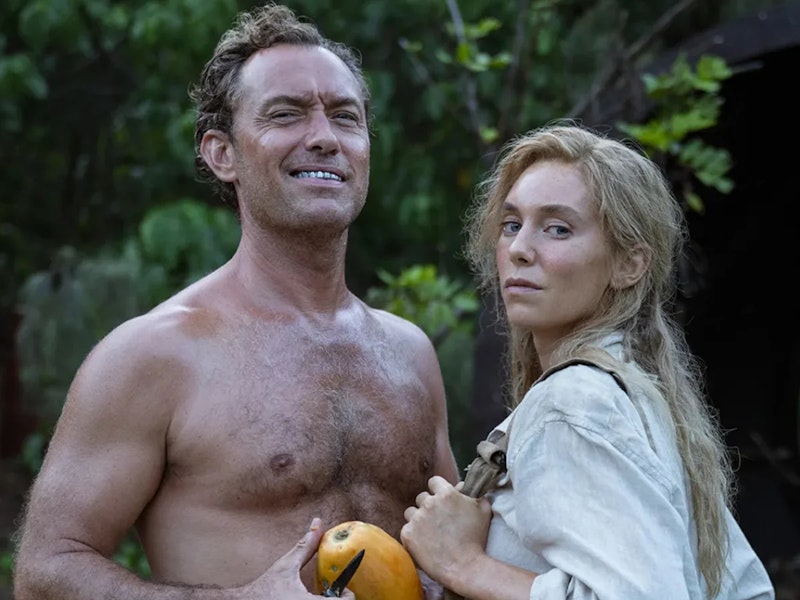One of the best jokes in the Apple TV+ comedy The Studio involved a cameo from Ron Howard, who appeared as a fictionalized version himself during a meeting with Matt Remick (Seth Rogen), the newly appointed head of Continental Studios. It’s a subversion of Howard’s reputation as one of the most collaborative, nicest guys in the industry, as he’s allowed to mercilessly bully Remick after he misinterpreted a critical scene in Howard’s A Beautiful Mind. It’s not the only classic in Howard’s filmography that received additional attention this year; his fantasy adventure Willow got a shoutout in Weapons, and Apollo 13 recently returned to theaters for its 30th anniversary and the death of astronaut Jim Lovell.
A majority of audiences that caught these references aren’t likely aware that Howard has a new film, released with little fanfare at the end of August during the transitional period between summer blockbusters and fall awards titles. Eden debuted at the Toronto International Film Festival last year, but failed to earn a distributor due to its significant budget, much of which went to the A-listers in the cast. Vertical Entertainment may have offered the film a route to theaters, but the dearth of marketing would suggests it’ll disappear quickly from cinemas. Vertical’s theatrical releases have essentially served as extended advertisements for their eventual debuts on streaming.
It’s surprising that Howard struggled to find an audience. He’s been praised and lampooned for his ability to make safe, audience-friendly films that are unlikely to ruffle feathers. While Howard found awards success with biopics, including the aforementioned A Beautiful Mind and Apollo 13, he’s also responsible for crowd-pleasing ensemble comedies like Splash, Parenthood, and Nightshift. Even if Howard has conveyed an earnest enthusiasm about each of his projects, he’s not above taking a paycheck; despite dismal reviews, Howard reaped in significant box office grosses for his live-action remake of How The Grinch Stole Christmas, as well as the trilogy of Dan Brown adaptations that starred Tom Hanks as Professor Robert Langdon.
Eden is another true story, but not one in the inspirational vein of Cinderella Man or Thirteen Lives. The film’s inspired by the exploits of European settlers that formed a colony in Floreana Island in the Galápagos Islands, who aimed to create a utopian society during the decade that preceded World War II. The medicinal genius Dr. Friedrich Ritter (Jude Law) and his wife Dora (Vanessa Kirby) gained enough exposure that their expedition inspired a similar move for the German couple Margret (Sydney Sweeney) and Heinz Wittmer (Daniel Bruhl), who expected to raise a family on the island. Although the Ritters were bitterly opposed to their new neighbors, the tension on the island escalated upon the arrival of the Baroness Eloise Bosquet de Wagner Wehrhorn (Ana de Armas), who was joined by a haughty group of advisors and servants.
There are two primary conflicts in Eden; one is the customary patterns of nature that have always thwarted attempts to harvest the Earth of its resources, and the other is the eventual friction caused by humans that are forced to cohabitate. While neither’s a new concept, it’s surprising to see someone as traditionalist as Howard take on a story that doesn’t offer any clean truisms. Howard told the stories of John Nash, James Braddock, James Hunt, and the Apollo 13 astronauts with the hope that they could inspire people to maximize their potential. Eden isn’t only scornful of its characters, and Howard seemed to take a sick pleasure in seeing them tortured.
There’s been plenty of contemporary satires about “rich people behaving badly,” but the cruelty of Eden isn’t entirely based on the characters’ privileges. Rather, Howard has mocked the self-assured notion that they could escape the heathens of globalization and find a new venue to start from scratch. This assumption is a rejection of history, and Eden doesn’t shy away from the consequences that come from an ill-equipped trip into the wilderness. If it wasn’t for the slick production values and recognizable stars in the ensemble, Eden could be mistaken for a well-crafted work of exploitation.
I think Eden was made in response to the underwhelming performance of recent Howard films, which put a little too much faith in their audiences to become invested in truth. Howard’s last biopic Thirteen Lives, based on the Thai cave resume mission, was so meticulous and procedural that it was nearly indistinguishable from the documentary The Rescue, which covered the same subject. Conversely, Eden is a reminder that Howard is a dramatist, as a series of melodramatic marital woes and infidelities reflect the narcissism of the characters. No one in the cast has a believable accent, but Law and Kirby deserve credit for their absurdist interpretations of German phrases.
Eden is the equivalent of a 1970s disaster film like The Andromeda Strain or Airport, in which a prominent ensemble of major stars were given the opportunity to give exaggerated, theatrical performances without irony. De Armas has the most compelling role, as Eloise is so ridiculous in her denial of reality that it’s rewarding to see her get her comeuppance. Sweeney may have found herself in the midst of an entirely different controversy, but she’s well-cast as the film’s only character willing to admit that this endeavor was a bad idea from the beginning.
The last decade may have indicated that Howard’s “nice guy” persona hasn’t done him any favors, as he became the fall guy for a series of studio fumbles. Howard got backlash when Solo: A Star Wars Story became the first film in the franchise to bomb at the box office, received venomous criticism for his sympathetic adaptation of Hillbilly Elegy, and watched as Thirteen Lives was dumped on Prime Video without a substantial theatrical release. Howard was in a position where he had something to prove for the first time since he exited Happy Days to embark on his career as a filmmaker; perhaps, he’s now unlocked a new chapter in his long career.

